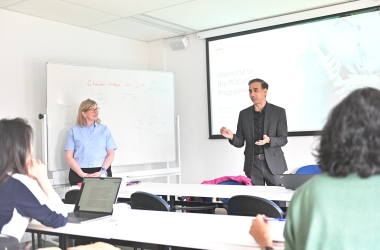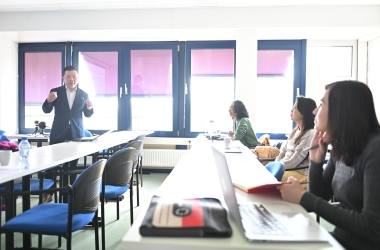Wittenborg Online News!
Expanding Horizons: PGCert Programme Offers Workshops on Innovative Education Processes
Expanding Horizons: PGCert Programme Offers Workshops on Innovative Education Processes

Expanding Horizons: PGCert Programme Offers Workshops on Innovative Education Processes
Activities Explore ABC Learning Design and Gamification in Higher Education
To support education professionals in enhancing their teaching practices and aligning with the evolving demands and opportunities in higher education, Wittenborg organised the first two workshops of its Postgraduate Certificate in Teaching & Learning in Higher Education (PGCert) on 24 and 25 March.
The first event was the webinar ‘Applying the ABC Learning Design, Community of Inquiry, and UDL Principles to Enhance Inclusive Learning’, led by Hilary Wason, Head of Curriculum and Academic Staff Development at Kingston University. The second workshop, delivered by Wittenborg Senior Lecturer Fjorentina Muco, addressed Gamification in Higher Education.
Among other objectives, Wason’s session sought to provide a practical framework called the ABC Learning Design Framework, which enables educators to design inclusive activities. This contributes to the establishment of a learning community where students engage with each other and with their disciplinary content. Additionally, the workshop encouraged educators to critically reflect on their practices using the six learning types of the ABC framework and consider the most productive way of designing learning to reflect the needs of their students and disciplinary content.
For Wason, students’ learning environments are critical to promote productive engagement in study. “They empower students to develop their cognitive skills and higher-order thinking, and also encourage affective and interpersonal expression, open communication and group cohesion, which are crucial for academic success and employability.”
She added that continuous critical reflection is essential for educators. “My advice to education professionals is that they adopt research and evidence-based learning, teaching and course design practices, which embrace the full range of learning environments, both in face-to-face settings and using asynchronous opportunities.”
In her workshop, Wittenborg Senior Lecturer Fjorentina Muco examined the pedagogical potential of gamification in higher education, highlighting innovative strategies to boost student engagement and learning. Muco’s session explored the concept of gamification, distinguishing between gamified and game-based activities, as well as the purpose and key elements of gamification. She also discussed the challenges inherent to these activities and the benefits of gamification, including increased motivation, engagement, collaboration, stronger relationships and a sense of belonging.

The Senior Lecturer emphasised that innovative teaching approaches boost the quality of education, which will ultimately impact the industry. “Educators need to be constantly updated on innovative ideas that are developed on education and integrate them as part of their teaching methods.”
According to Deputy Head of School of Business Dadi Chen, the PGCert workshops were very successful and productive. “The best part is that activities like these help participants to enhance their skills in curriculum development and pedagogy with new inspirations, insights and practical tools. We are planning more faculty development workshops for the academic year.”
The sessions were attended by two Wittenborg faculty members currently enrolled in the PGCert programme: Assistant Professor Hind Albasry and Associate Professor Vanessa de Oliveira Menezes.
Menezes noted that despite her extensive teaching experience, the PGCert programme provides a structured, evidence-based approach to refining her pedagogical methods. “I've been a lecturer for many years, and no matter how open I've always been to improving my teaching methods, all the changes I've implemented in the classroom were based on intuition, trial and error, in a very informal way. Even with so many academic degrees, I had never taken a specific course on teaching methodology or studied the subject in depth. But teaching is about understanding that we are always learners, and that’s why I decided to join the PGCert. It’s been great, and I’ve already had some really cool insights that I plan to apply soon.”
Content of the programme
With two intakes per year, in February and September, the PGCert can be completed in six months full-time or 12 to 18 months part-time. The programme comprises the modules of Advanced Pedagogy and Inclusive Higher Education, Advancing Instructional Skills through Evaluation and Educational Inquiry Project.
WUP 10/04/2025
by Ulisses Sawczuk
©WUAS Press
670 words